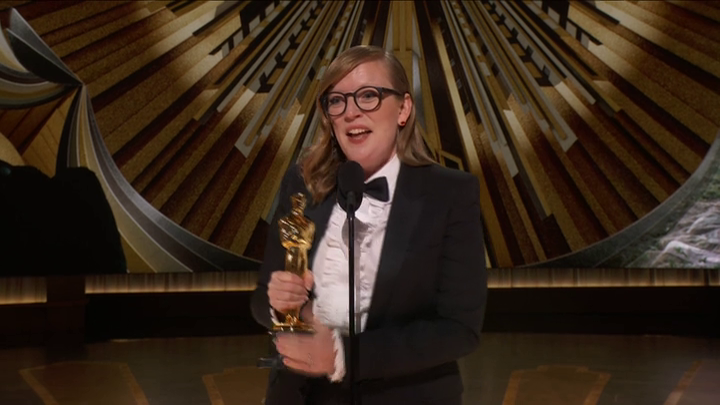
Women Talking has had a pretty rocky road to the Oscars. From being anointed as one of the early frontrunners to possibly win Best Picture to barely squeaking into the actual nominations - only getting nods for Picture and Adapted Screenplay, the film struggled to find footing during the awards race as more vocal support went towards other films. Believe me, as someone who loves the film dearly, it was hard to watch this film be up in the air for majority of the season.
Coming into the Oscar night, its only real shot at winning was for Adapted Screenplay as Everything Everywhere All at Once's victory lap at Picture seemed secure. The only problem was Adapted Screenplay also contained what was arguably the Best Picture runner-up: All Quiet on the Western Front...
Having won four Oscars before Adapted Screenplay - even in tight races like Original Score and a shocking win for Production Design, I was resigned that Women Talking would go home empty-handed from its meager nomination count.
But then Florence Pugh announced the winner for Adapted Screenplay: WOMEN TALKING. Thunderous applause and cheers from the audience erupted. I screamed too:
YESSSSSSSSSSS WOMEN ARE TALKING THIS IS SARAH POLLEY’S MOMENT #OSCARS #FILMTWITTER pic.twitter.com/83QXppmsKm
— Juan Carlos Ojano 🌷 (@carlosojano) March 13, 2023
As writer-director Sarah Polley rushed to the stage, Hildur Guðnadóttir's haunting (and bafflingly not nominated) music for the film played. Standing ovation from the crowd. It was glorious and cathartic to see the win. Polley then proceeded to give a beautiful speech that stuck with me the following day. I've tried to break down why:


"First of all, I just want to thank the Academy for not being mortally offended by the words "women" and "talking" put so close together like that. Cheers!"
A biting acknowledgment to Oscar's usual aversion to female-centered stories. Polley knew the gravity of the moment and she delivered it with sleek humor. The odds the film had to overcome to even get to this point was huge. Not just her film but female-centered stories during awards season, period. It's simple but it has a subtle sting.
"Miriam Toews wrote an essential novel about a radical act of democracy in which people who don't agree on every single issue managed to sit together in a room and carve out a way forward together, free of violence. They do so not just by talking but also by listening."
Polley goes beyond the rudimentary appreciation of the source material. Instead, she highlights the significance of Toews' work and how it goes beyond just the novel and the film itself. It's an eloquently worded tribute to Toews' storytelling.

"The last line of our film is delivered by a young woman to a new baby and she says, "your story will be different from ours". It's a promise, a commitment, and an anchor and it's what I would like to say with all of my might to my three incredible kids Eve, Isla, and Amy as they make their way through this complicated, beautiful world."
Polley then weaves the thread that connects Toews' work to her own storytelling. Her dedicating this moment to her children highlights the reason why this film will live on beyond the noise and glamor of awards season. It's a moment of humility for Polley, accepting the task of trying to create a better story and world for her children.
"Thank you to the best man I've ever known, David Sandomierski, for giving me the optimism to believe we can and will do better."
As she broaches the subject of family, Polley proceeds to thank her husband. In true spirit of the novel/film, the onus to make things better is not squarely left on a single sex. Rather, it requires that both men and women affect change working together. Of course, it's a personal moment for this couple but it still connects to the film.

"Dede Gardner and Frances McDormand, thank you for letting me stand on your shoulders and making the space for me."
From one family to another, Polley shows her recognition of the two women who shepherded the project from the beginning and gave her the support that she needed to be able to tell this story. If you have seen some of the interviews, you know how the trio of Gardner, McDormand, and Polley connected in a close to serendipitous way.



"We have the most incredible cast and the most incredible crew, some of whom are here tonight. Please stand up if you're there or if you're in the nosebleeds and everybody at home who've worked on this film. Oh, my God. I accept this on all of our behalf. Thank you, thank you! Wow!"
Polley probably understood, given the less-than-expected recognition given the cast and crew, that this was the best (and probably last) time for her to shine a big light on the family that she has fostered in the making of this film. In the audience are Sheila McCarthy cheering, Rooney Mara and Jessie Buckley hesitant to stand up while laughing, and some crew members in the bleachers.

In a speech that lasted for less than two minutes, Oscar winner Sarah Polley was able to encapsulate gratitude to everyone involved, from the genesis of the project up to the Academy that voted on the film. It is a fitting tribute to one of 2022's best films which, despite a weird awards run, persisted and persevered until everything led to this great Oscar moment.